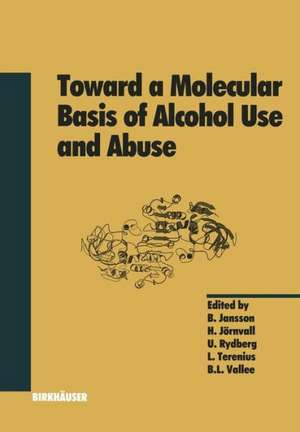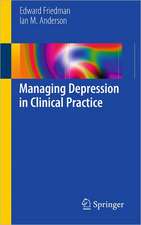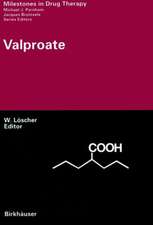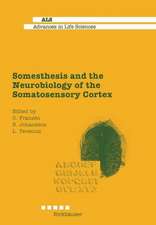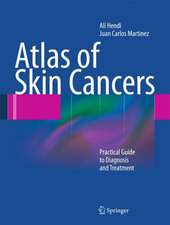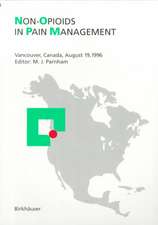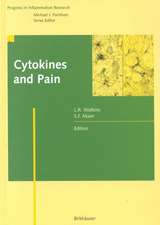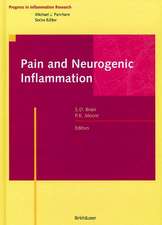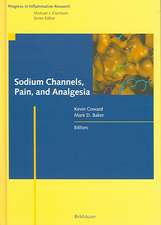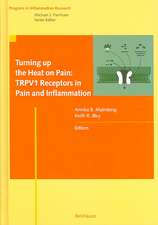Toward a Molecular Basis of Alcohol Use and Abuse: Experientia Supplementum, cartea 71
Editat de B. Jansson, H. Jörnvall, U. Rydberg, L. Terenius, B.L. Valleeen Limba Engleză Paperback – 16 mar 2012
Din seria Experientia Supplementum
- 5%
 Preț: 1343.50 lei
Preț: 1343.50 lei - 5%
 Preț: 984.91 lei
Preț: 984.91 lei -
 Preț: 330.76 lei
Preț: 330.76 lei -
 Preț: 282.83 lei
Preț: 282.83 lei -
 Preț: 302.84 lei
Preț: 302.84 lei -
 Preț: 192.21 lei
Preț: 192.21 lei - 5%
 Preț: 369.45 lei
Preț: 369.45 lei - 5%
 Preț: 382.62 lei
Preț: 382.62 lei - 15%
 Preț: 644.18 lei
Preț: 644.18 lei - 18%
 Preț: 944.51 lei
Preț: 944.51 lei - 18%
 Preț: 944.51 lei
Preț: 944.51 lei - 5%
 Preț: 715.55 lei
Preț: 715.55 lei - 15%
 Preț: 647.40 lei
Preț: 647.40 lei - 15%
 Preț: 646.94 lei
Preț: 646.94 lei - 5%
 Preț: 1430.00 lei
Preț: 1430.00 lei - 5%
 Preț: 1107.58 lei
Preț: 1107.58 lei - 5%
 Preț: 1048.73 lei
Preț: 1048.73 lei - 5%
 Preț: 902.80 lei
Preț: 902.80 lei - 5%
 Preț: 1294.47 lei
Preț: 1294.47 lei - 5%
 Preț: 1287.38 lei
Preț: 1287.38 lei - 18%
 Preț: 950.66 lei
Preț: 950.66 lei -
 Preț: 343.59 lei
Preț: 343.59 lei -
 Preț: 401.24 lei
Preț: 401.24 lei - 15%
 Preț: 666.24 lei
Preț: 666.24 lei -
 Preț: 344.36 lei
Preț: 344.36 lei -
 Preț: 383.33 lei
Preț: 383.33 lei -
 Preț: 503.74 lei
Preț: 503.74 lei -
 Preț: 388.52 lei
Preț: 388.52 lei - 15%
 Preț: 471.53 lei
Preț: 471.53 lei -
 Preț: 432.81 lei
Preț: 432.81 lei - 15%
 Preț: 480.09 lei
Preț: 480.09 lei -
 Preț: 400.47 lei
Preț: 400.47 lei -
 Preț: 377.18 lei
Preț: 377.18 lei -
 Preț: 481.58 lei
Preț: 481.58 lei - 18%
 Preț: 949.23 lei
Preț: 949.23 lei - 15%
 Preț: 505.96 lei
Preț: 505.96 lei -
 Preț: 381.43 lei
Preț: 381.43 lei -
 Preț: 390.08 lei
Preț: 390.08 lei -
 Preț: 463.41 lei
Preț: 463.41 lei -
 Preț: 424.22 lei
Preț: 424.22 lei -
 Preț: 467.43 lei
Preț: 467.43 lei -
 Preț: 381.21 lei
Preț: 381.21 lei
Preț: 398.92 lei
Nou
Puncte Express: 598
Preț estimativ în valută:
76.34€ • 79.41$ • 63.03£
76.34€ • 79.41$ • 63.03£
Carte tipărită la comandă
Livrare economică 14-28 aprilie
Preluare comenzi: 021 569.72.76
Specificații
ISBN-13: 9783034873321
ISBN-10: 3034873328
Pagini: 424
Ilustrații: 407 p.
Dimensiuni: 170 x 244 x 22 mm
Greutate: 0.67 kg
Ediția:Softcover reprint of the original 1st ed. 1994
Editura: Birkhäuser Basel
Colecția Birkhäuser
Seria Experientia Supplementum
Locul publicării:Basel, Switzerland
ISBN-10: 3034873328
Pagini: 424
Ilustrații: 407 p.
Dimensiuni: 170 x 244 x 22 mm
Greutate: 0.67 kg
Ediția:Softcover reprint of the original 1st ed. 1994
Editura: Birkhäuser Basel
Colecția Birkhäuser
Seria Experientia Supplementum
Locul publicării:Basel, Switzerland
Public țintă
ResearchCuprins
Perspectives.- Alcohol in human history.- Section 1: Neuropharmacological aspects.- Reward and its control by dynorphin peptides.- Adaptation of signal transduction in brain.- Protein kinase C and adaptation to ethanol.- Molecular control of neuronal survival in the chick embryo.- Effects of alcohol on gene expression in neural cells.- The role of the NMDA receptor in ethanol withdrawal.- Molecular diversity of glutamate receptors and their physiological functions.- Multiple dopamine receptors: The D3 receptor and actions of substances of abuse.- Molecular pharmacology of serotonin receptors.- Alcohol, the reward system and dependence.- Section 2: Biological markers and special clinical features.- Clinical aspects on molecular probes, markers and metabolism.- Familial alcoholism. Family, twin adoption and high risk studies.- Association strategies in substance abuse.- PET-determination of benzodiazepine receptor binding in studies on alcoholism.- Serotonin, violent behavior and alcohol.- Neuropeptides and alcohol addiction in monkeys.- The role of adenosine in mediating cellular and molecular responses to ethanol.- Helicobacter pylori alcohol dehydrogenase.- Genetic polymorphism of cytochrome P450. Functional consequences and possible relationship to disease and alcohol toxicity.- Serotonin-altering medications and desire, consumption and effects of alcohol — treatment implications.- Section 3: Enzymatic aspects.- The alcohol dehydrogenase system.- Drug metabolism and signal transduction: Possible role of Ah receptor and arachidonic acid cascade in protection from ethanol toxicity.- Recruitment of enzymes and stress proteins as lens crystallins.- X-ray structure of PQQ-dependent methanol dehydrogenase.- NMR, alcohols, protein solvation and protein denaturation.-Crystallographic investigations of alcohol dehydrogenases.- Retinoids and the alcohol dehydrogenase gene family.- Alcohol and acetaldehyde dehydrogenase gene polymorphism and alcoholism.- Site-directed mutagenesis and enzyme properties of mammalian alcohol dehydrogenases correlated with their tissue distribution.- Control of alcohol metabolism.- Angiotensin converting enzyme inhibitors and alcohol abuse.- Section 4: Clinical aspects and pharmacological approaches.- Treatment of alcoholism.- Alcohol sensitivity and dependence.- Treatment of alcoholism as a chronic disorder.- Addiction and the potential for therapeutic drug development.- Therapeutic lessons from traditional Oriental medicine to contemporary Occidental pharmacology.- Potential gene therapy for alcoholism.- Outlook: Prospects for alcoholism treatment.
